Darcia Helle's Blog, page 22
February 3, 2022
Book Review — THE MAGNOLIA PALACE by Fiona Davis

Eight months since losing her mother in the Spanish flu outbreak of 1919, twenty-one-year-old Lillian Carter’s life has completely fallen apart. For the past six years, under the moniker Angelica, Lillian was one of the most sought-after artists’ models in New York City, with statues based on her figure gracing landmarks from the Plaza Hotel to the Brooklyn Bridge. But with her mother gone, a grieving Lillian is rudderless and desperate—the work has dried up and a looming scandal has left her entirely without a safe haven. So when she stumbles upon an employment opportunity at the Frick mansion—a building that, ironically, bears her own visage—Lillian jumps at the chance. But the longer she works as a private secretary to the imperious and demanding Helen Frick, the daughter and heiress of industrialist and art patron Henry Clay Frick, the more deeply her life gets intertwined with that of the family—pulling her into a tangled web of romantic trysts, stolen jewels, and family drama that runs so deep, the stakes just may be life or death.
Nearly fifty years later, mod English model Veronica Weber has her own chance to make her career—and with it, earn the money she needs to support her family back home—within the walls of the former Frick residence, now converted into one of New York City’s most impressive museums. But when she—along with a charming intern/budding art curator named Joshua—is dismissed from the Vogue shoot taking place at the Frick Collection, she chances upon a series of hidden messages in the museum: messages that will lead her and Joshua on a hunt that could not only solve Veronica’s financial woes, but could finally reveal the truth behind a decades-old murder in the infamous Frick family.
Published: January 25, 2022
My ThoughtsI love when a book transports me to a different era, immersing me in a specific setting. Fiona Davis makes me feel like I’ve traveled back in a time machine. I was living these other lives vicariously through the characters.
The Magnolia Palace is told via dual timelines. Our main story takes place in 1919, where Lillian Carter, a young model, finds herself alone and adrift in a society that loves art but not the women who pose for it.
Our secondary story takes place in 1966, where another young woman trying to make it as a model lands at the mansion where Lillian once took refuge.
These two timelines eventually converge in an unexpected way, giving me all the feels.
The Magnolia Palace is loosely based on the real-life Frick family and their mansion, which is now a museum. The author discusses this in her Author’s Note at the end of the book.

The post Book Review — THE MAGNOLIA PALACE by Fiona Davis appeared first on Quiet Fury Books.
February 1, 2022
Happy. Married. Missing. — WOMAN LAST SEEN by Adele Parks
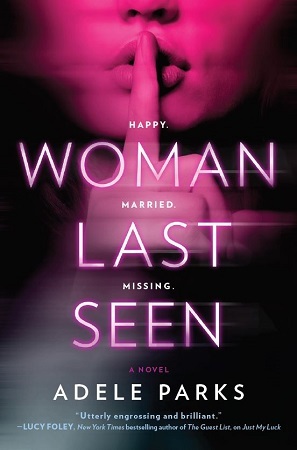 HAPPY. MARRIED. MISSING.
HAPPY. MARRIED. MISSING.
Leigh Fletcher: happily married stepmum to two gorgeous boys goes missing on Monday. Her husband Mark says he knows nothing of her whereabouts. She simply went towork and just never came home. Their family is shattered.
Kai Janssen : married to wealthy Dutch businessman, Daan, vanishes the same week. Kai left their luxurious penthouse and glamourous world without a backward glance. She seemingly evaporated into thin air. Daan is distraught.
DC Clements knows that people disappear all the time – far too frequently. Most run away from things, some run towards, others are taken but find their way back. A sad few never return. These two women are from very different worlds, their disappearances are unlikely to be connected. And yet, at a gut level, the DC believes they might be.
How could these women walk away from their families, husbands and homes willingly? Clements is determined to unearth the truth, no matter how shocking and devastating it may be.
WOMAN LAST SEEN
Author: Adele Parks
ISBN: 9780778312048
Publication Date: February 1, 2022
Publisher: MIRA Books
Buy Links:
BookShop.org
Harlequin
Barnes & Noble
Amazon
Books-A-Million
Powell’s
1
Tuesday, 17th March
I am engulfed in emptiness. I’m not in my bed. I am not in any bed.
In the instant my eyes flutter open I know there is some-thing wrong. Seriously wrong. It’s dark. I’m suspended in a threatening, airless blackness. I’m lying down but am dis-orientated because I’m on a cold concrete floor. A floor that looks as though it’s waiting to be tiled, but something immediately suggests to me it never will be. My mind is lazy and unable to process why I think this. I can’t remember when I last slept on a floor, a million years ago when I was a student and would bunk in on another student’s room if I was too drunk to get home. I try to sit up; my limbs feel heavy, my head sore. I try to stand up but as I do so, I am yanked back down, my left hand is tethered. Chained. I hear the rattle of the chain at the same time as I feel the cold tug. Am I dreaming? My head pulses, swells and then bursts, I close my eyes again, my lids are like sandpaper scratching, I open them for a second time, giving them a chance to adjust to the darkness. Is it my dizziness that’s leaving everything unfamiliar? Shaky? I feel slow, behind myself.
How much did I have to drink last night? I try to remember. I can’t. And then—this is terrifying—I realize I can’t remember last night at all. I feel sick. I can smell vomit, suggesting I have already been sick. I should not be waking to the smell of vomit. Where is the smell of my husband’s early morning breath? There is no smell of toast from the kitchen, no traces of the Jo Malone Lime Basil and Mandarin room spray that I sometimes wake to. I’m somewhere dusty, not damp, a little overwarm. Am I in a hospital? No. What sort of hospital makes patients lie on the floor, chains them? There are no sounds. My boys are not arguing in the kitchen, the TV is not blaring, no doors opening, slamming, no demands, “Mum, where are my football shorts?” I wait, sometimes I wake to something more serene. Sometimes it is Radio 4 and the smell of coffee.
Nothing.
Alarm and horror flood through my body. My organs and limbs turn to liquid and I can’t coordinate my movements. None of us are that naive anymore. The news doesn’t always enlighten or inform, often it terrifies. My foggy mind realizes I must have been drugged. I have been abducted. The terrible thing that you read about that happens to someone else—someone other—has happened to me.
Panicked, I tug hard at the chain, there’s no give. I scramble about in the darkness. Trying to understand my environment. I can’t move far because of the chain, which is attached to a radiator at one end and through a zip tie that is tight around my wrist on the other. The chain is about a meter long. As my eyes adjust, I see that I am in a room that is about three meters long by just over two, like a standard guest room. The walls are manila. It is clean and bare. I am not in a derelict warehouse or abandoned cottage. It’s bland to the state of anonymous. I imagine that is the point. I could be anywhere. There’s no furniture in the room. None at all. Not a bed, a mattress, a lamp. Nothing to soften or comfort. Just a plastic bucket. I realize what this is intended for and my stomach heaves. I can see the outline of a door and a boarded-up window. I can’t reach the door as it’s in the far corner, or the window as that’s at the end of the wall opposite the one with the radiator I am chained to.
I go to check the time, but my Fitbit has been removed. Not knowing what time it is, or even what day it is for sure, sends spikes of isolation and confusion through my body. Still, I have my voice. I can shout and maybe attract attention. I fleetingly consider that shouting will attract the attention of whoever it is that brought me here. He could do a lot worse to me that chain me up, but I have no choice.
“Help! Help me! Help!” My voice shatters the dead unnatural silence. I yell over and over again until I become hoarse. The pain in my tender head intensifies.
No one comes.
No one responds.
The silence stretches. I stop yelling and listen. Hoping to hear something, cars in the distance, people in the street, bird-song, as the light has started to eke around the boarded window. A new day, but which day is it? Nothing. It’s like I’m in a vacuum. Then, I hear footsteps coming toward the door.
“Please, please let me out,” I whimper. I’m crying now. I’m not sure when I started crying. Tears and mucus pour down my face. I don’t want to be weak. I want to be strong, brave, resistant. That’s what you imagine you’ll be in a situation like this but it’s beyond me. It’s a ludicrous fantasy. I am just terrified. I will beg, plead, implore. Anything to stay safe. Any-thing. “Please, please don’t hurt me. Please.”
Then I hear the distinct sound of the keystrokes of an old-fashioned typewriter being pounded. A sort of shuffling rat-tat-tat. Slow, precise. Like a hostile countdown. Next, the hurried juddering whirl of paper being forcefully pulled out of the machine’s roller. It is incongruous, this passé sound is the domain of busy newspaper rooms in decades gone by. Who has a typewriter anymore? There is rustling, as the piece of paper is pushed beneath the door. I stretch to reach it, but it is tantalizingly out of my grasp. I lie on the floor and carefully, oh so slowly, edge it nearer with my toes until I can drag it close enough to snatch it up.
I am not the villain here.
Excerpted from Woman Last Seen by Adele Parks, Copyright © 2022 by Adele Parks. Published by arrangement with Harlequin Books S.A.
 Adele Parks, Hon Grad, photographed at home in Guildford for The Graduate magazine
Adele Parks, Hon Grad, photographed at home in Guildford for The Graduate magazineAdele Parks was born in Teesside, North-East England. Her first novel, Playing Away, was published in 2000 and since then she’s had 20 international bestsellers, translated into twenty-six languages. She’s been an Ambassador for The Reading Agency and a judge for the Costa. She’s lived in Italy, Botswana and London, and is now settled in Guildford, Surrey, with her husband, teenage son and cat.
Social Links:
Author Website
Instagram: @adele_parks
Twitter: @adeleparks
Facebook: @OfficialAdeleParks
Goodreads

The post Happy. Married. Missing. — WOMAN LAST SEEN by Adele Parks appeared first on Quiet Fury Books.
January 31, 2022
New Release Spotlight — THE LIZ TAYLOR RING by Brenda Janowitz
 Three siblings. A priceless family ring. One legendary love story.
Three siblings. A priceless family ring. One legendary love story.
In 1978, Lizzie Morgan and Ritchie Schneider embark on a whirlwind romance on the bright beaches and glamorous yachts of Long Island. Over the years, their relationship has its share of ups and downs, including a nine-month hiatus that ends with a stunning eleven-carat ring—one that looks just like the diamond Richard Burton gifted Liz Taylor after their own separation. Like the famous couple, despite the drama that would unfold throughout the Schneiders’ marriage, the ring would be there as a symbol of their love…until it wasn’t.
Decades later, when the lost ring unexpectedly resurfaces, the Schneiders’ three children gather under one roof for the first time in years, eager to get their hands on this beloved, expensive reminder of their departed parents. But determining the fate of the heirloom is no simple task, unearthing old wounds and heartaches the siblings can’t ignore. And when the ring reveals a secret that challenges everything they thought they knew about their parents’ epic love story, they’ll have to decide whether to move forward as a family or let the ring break them once and for all.
The Liz Taylor Ring
Author: Brenda Janowitz
ISBN: 9781525806476
Publication Date: February 1, 2022
Publisher: Graydon House
Buy Links:
BookShop.org
Harlequin
Barnes & Noble
Amazon
Books-A-Million
Powell’s
Addy looked at herself in the mirror. Surely every woman looked like a wet dog after getting their hair washed at the hairdresser, didn’t they?
She examined the lines of her face, the rings under her eyes. She looked tired. She looked old. She didn’t look like herself anymore.
“Just to lighten you up a bit,” Roberto said, running his hands through her hair. He’d been styling her hair since she was nineteen—just over twenty years—and his pleas to color it had gotten more insistent as of late.
But she would not be one of those women who colored her hair. She simply would not. After all, she had daughters to raise, twin girls who were sixteen years old. She had to set a good example.
“You know how I feel about coloring my hair.”
“Remind me again.”
“It’s antifeminist.”
“Coloring your hair does not have to be a political statement,” he said, self-consciously examining his own hairline, receding ever so slightly, in the mirror. “Forty is the new thirty, you know.”
“I’m forty-one.” Addy pressed her fingers to the lines that led from the edge of her lip, up to the side of her nose. Marionette lines, they called them. As if women were just wooden dolls, controlled by a master. Most women her age had already started Botox and fillers. They threw Botox parties at each other’s houses, getting shot up by people who weren’t even doctors. Still, they looked good. Better than she did.
“Oh, well, forty-one’s the new sixty.” They both laughed.
“Just a trim.”
“I could easily make you look the way you looked when we first met. It would only take an hour.”
When Roberto referenced when we first met, he meant the summer she turned nineteen. When she let her blond hair lighten in the sun, when it flowed in wavy bursts down her back. She could let her hair dry naturally and it would still look like it had been professionally done. She walked into the salon carefree, unencumbered by kids’ schedules, what to make for dinner that night, and college funds. She walked into the salon with a smile on her face, open to the possibilities of life in a way she could no longer fathom now. That’s how he saw her. That’s how he remembered that summer.
That’s not what Addy remembered. It was the summer after freshman year of college, and she’d come home to work with her dad, to learn how to run a retail store. Her father was still learning the retail game himself. Recently sworn off gambling and desperate for a job (a real job, not one of those get-rich-quick schemes he’d been chasing since the day he met her mother), he’d gotten the place for a steal from a friend of the family. It was a small store in the center of their Long Island town, filled with fast fashion. The sort of clothes that were ridiculously trendy and would go out of style in a season. (Which was good, because the quality only lasted a season, too.)
He called the store “Lizzie and Ritchie’s” in a romantic gesture, and new to the retail game, he did all the books by hand. Addy was dying to put her digital marketing class to use, and when she told her father that one of her classmates had started a website and then quit school because the company took off, he wanted in. She got him onto QuickBooks, created a website, modeled all the clothing herself, and turned Lizzie and Ritchie’s into a dot-com. Ritchie barely understood what his daughter was doing, but he humored her because he loved her so much. He humored her because he was a doting father who hated to say no to his daughter. (Also, she was the smart one.)
Within a month, he understood. They could barely keep up with the online demand, and Addy brokered a deal with a classmate from Texas, whose family owned a manufacturing plant, to start making the clothing themselves. Within six months, Addy was back at school, and Ritchie had expanded his operation to a team of four. Within a year, the store was a half a million dollar a year business. Within three years, he expanded his team to ten. Within five years, his company—one brick-and-mortar shop and an online store—was a multimillion dollar enterprise.
And it was all because of Addy.
“We don’t even have to go to your old color,” Roberto said, pulling up a picture of a model on his phone. “We could make you a buttery dirty blond.”
“Showing my girls that I’m ashamed to get older is not the example I want to set,” Addy said, even though the sound of butter and dirt was intriguing.
“Your girls are all over Instagram giving Gigi and Bella a run for their money.”
“The modeling thing is just for fun,” Addy explained, as she’d explained to countless other people countless other times. “Gary really started having them do it to build their confidence.” (And
because Addy was now too old to model the clothes herself, but better to leave that part unsaid.)
“I’d say they’re confident enough. Have you seen this?” He turned his phone toward Addy, and she immediately recognized it as the Lizzie and Ritchie’s Instagram page. A picture of her girls filled the screen: the clothes were beside the point (but they were wearing clothes, weren’t they?) as they stood, legs wide apart, mouths open, thumbs tugging on their bottom lips. The image was bold. It was strong. It was undeniably sexual. Addy was horrified.
“Of course I’ve seen that.” She had not. “At least they’re not coloring their hair.”
“Are they eating?” Roberto closed the photo and began scrolling through their individual feeds.
“Of course they eat.” When she was sixteen, Addy still had baby fat. Her girls had cheekbones like razor blades, bellies flat and taut. When she’d ask, Emma would laugh and explain how easy it was to manipulate the way you looked with makeup, camera angles, and filters. But Addy wasn’t so sure. “Lemme see that.”
As Roberto handed over his phone, Addy’s own phone rang out, the sound of an old-fashioned telephone filling the air.
“Do you need to get that?” he asked, holding up her purse with the ringing phone inside.
“No,” she said, transfixed by the store’s Instagram account. And then, instantly remembering herself: “I mean yes.” Addy swapped phones with Roberto. “It could be the girls or their school.” Addy looked at the screen. It was a number she didn’t recognize. The exchange looked international, a jumble of extra numbers. “I can let this go to voice mail.”
It would be hours before she remembered to check her messages. Long after her girls came home from school. After her husband came home from work. After she cooked dinner and
served it. After she fell into bed at ten, too tired to stay up to watch TV with Gary. It wasn’t until the next morning, after breakfast, that she remembered to check her voice mail.
And after that, nothing would be the same.
Excerpted from The Liz Taylor Ring by Brenda Janowitz, Copyright © 2021 by Brenda Janowitz. Published by arrangement with Harlequin Books S.A.
About the AuthorBrenda is the author of seven novels, includingTHE GRACE KELLY DRESS and the upcoming THE LIZ TAYLOR RING, which will be published by Harper Collins/ Graydon House on February 1, 2022. She is the former Books Correspondent for PopSugar. Her work has also appeared in The New York Times, The Washington Post, Real Simple, The Sunday Times (UK), Salon, Redbook, USA Today, Bustle,The Forward, the New York Post, Publisher’s Weekly, Hello Giggles, Writer’s Digest Magazine, WritersDigest.com, and xojane.
Brenda attended Cornell University and Hofstra Law School, where she was a member of the Law Review. Upon graduation from Hofstra, worked for the law firm Kaye Scholer, LLP, and did a federal clerkship with the Honorable Marilyn Dolan Go, United States Magistrate Judge for the Eastern District of New York.
Social Links:
Author Website
Twitter: @BrendaJanowitzr
Facebook: @BrendaJanowitz
Instagram: @brendajanowitzwriter
Goodreads

The post New Release Spotlight — THE LIZ TAYLOR RING by Brenda Janowitz appeared first on Quiet Fury Books.
January 30, 2022
New Release Spotlight — A LULLABY FOR WITCHES by Hester Fox
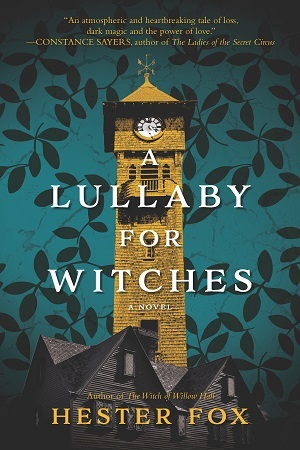 Augusta Podos has just landed her dream job, working in collections at a local museum, Harlowe House, located in the charming seaside town of Tynemouth, Massachusetts. Determined to tell the stories of the local community, she throws herself into her work–and finds an oblique mention of a mysterious woman, Margaret, who may have been part of the Harlowe family, but is reduced to a footnote. Fascinated by this strange omission, Augusta becomes obsessed with discovering who Margaret was, what happened to her, and why her family scrubbed her from historical records. But as she does, strange incidents begin plaguing Harlowe House and Augusta herself. Are they connected with Margaret, and what do they mean?
Augusta Podos has just landed her dream job, working in collections at a local museum, Harlowe House, located in the charming seaside town of Tynemouth, Massachusetts. Determined to tell the stories of the local community, she throws herself into her work–and finds an oblique mention of a mysterious woman, Margaret, who may have been part of the Harlowe family, but is reduced to a footnote. Fascinated by this strange omission, Augusta becomes obsessed with discovering who Margaret was, what happened to her, and why her family scrubbed her from historical records. But as she does, strange incidents begin plaguing Harlowe House and Augusta herself. Are they connected with Margaret, and what do they mean?
Tynemouth, 1872. Margaret Harlowe is the beautiful daughter of a wealthy shipping family, and she should have many prospects–but her fascination with herbs and spellwork has made her a pariah, with whispers of “witch” dogging her steps. Increasingly drawn to the darker, forbidden practices of her craft, Margaret finds herself caught up with a local man, Jack Pryce, and the temptation of these darker ways threatens to pull her under completely.
As the incidents in the present day escalate, Augusta finds herself drawn more and more deeply into Margaret’s world, and a shocking revelation sheds further light on Margaret and Augusta’s shared past. And as Margaret’s sinister purpose becomes clear, Augusta must uncover the secret of Margaret’s fate–before the woman who calls to her across the centuries claims Augusta’s own life.
LULLABY FOR WITCHES
Author: Hester Fox
ISBN: 9781525804694
Publication Date: February 1, 2022
Publisher: Graydon House
Buy Links:
BookShop.org
Harlequin
Barnes & Noble
Amazon
Books-A-Million
Powell’s
Prologue
Margaret
I was beautiful in the summer of 1876. The rocky Tynemouth coast was an easy place to be beautiful, though, with a fresh salt breeze that brought roses to my cheeks and sun that warmed my long hair, shooting the chestnut brown through with rich veins of copper. It was enough to make me forget—or at least, not care—that I was an outsider, a curiosity who left whispers in my wake when I walked through the muddy streets of our coastal town.
Do I miss being beautiful? Of course. But it’s the being found beautiful by others that I miss the most. It was the ambrosia that made an otherwise solitary life bearable. And it was being found beautiful by one man in particular, Jack Pryce, that I miss the most.
He would come to find me out behind my family’s house as I helped our maid hang the laundry on the lines or weeded my rocky garden. He always brought me a little gift, whether it was a toffee wrapped in wax paper from his parents’ shop, or just a little green flower he had plucked because it reminded him of my eyes. Something that told me I was special, that those stories around town of him stepping out with the Clerkenwell girl weren’t true.
“There she is,” he would say, coming up with his hands in his pockets and crooked grin on his full lips. “My lovely wildflower.” He called me this, he said, on account of my insistence on going without shoes on warm days when the grass was soft and lush. Whatever little chore I was doing would soon be forgotten as I led him out of sight of the house. With my back against a tree and his hands traveling under and up my skirts, we found euphoria in a panting tangle of limbs and hoarsely whispered promises. Heavy sea mists mingling with sweat in hair (his), the taste of berry-sweet lips (mine), the gut-deep knowing that he must love me. He must. He must. He must.
But like all things, summer came to an end, and autumn swept in with her cruel winds and killing frosts. Jack came less and less often, claiming first that it was work at the shop, then that he could no longer be seen with the girl who was rumored to practice witchcraft and worship at the altar of the moon on clear nights. Finally, on a day where the rain fell in icy sheets and even the screeching cries of the gulls could not compete with the howling wind, I realized he was not coming back.
Time moves differently now. Then, it was measured in church bells and birthdays, clock strokes and town harvest dances. It was measured in the monthly flow of my courses, until they stopped coming and my belly grew distended and full. Now—or perhaps it is better to say “here”—time is a fluid thing, like water that flows in all directions, finding and filling every crack and empty place, like my womb and my heart.
I did not want to give the babe up, though I knew it could only bring heartache and pain to my family. A mother’s heart is a stubborn thing, and no sooner had I felt the first stirrings of life within me, than I knew I would do anything in the world to protect my little one.
It was folly, I know that now. A woman like me could never hope to bring a child into this cruel world, could never hope that the honey-sweet words of a man like Jack Pryce carried any weight. What irony that I should not realize such simple truths until it was too late. Should not realize them until my blood ran icy in my veins and my broken heart stopped beating. Until the man I thought had loved me stood over my body, staring down as the life ran out of me like a streambed running dry. Until I was dead and cold and no longer so very beautiful.
1
Augusta
“Hello?” Augusta threw her keys on the table and slung her bag onto one of the kitchen chairs. As usual, a precarious stack of plates had taken over the sink, and the remnants of a Chinese food dinner sat out on the table. Sighing, she covered the leftovers with plastic wrap, stuck them in the fridge and followed the sounds of video games to the living room.
“I’m home,” she said tersely to the two guys hunched over their gaming consoles.
Doug barely glanced up, but her boyfriend, Chris, threw her a quick glance over his shoulder.
“Hey, we’re just finishing up.” Turning back, he continued mashing keys on the game controller, shaking his dark fringe from his eyes and muttering colorful insults at his opponent.
Chris and Doug weren’t the best housemates. Sure, they paid their share of the rent on time, but the house was constantly a mess, and video games took priority over household chores. She supposed that’s what she got for living with her boyfriend and allowing his unemployed brother to move in with them.
“Well, I guess I’ll be in my room if you need me,” Augusta said, too exhausted to pick a fight about the mess in the kitchen.
“You can stay and watch,” Chris said without turning back around.
She’d had a long, hard day. Between the air-conditioning being broken at work and discovering she only had ninety-eight dollars in her bank account after paying her cell phone bill, she wasn’t in the mood to watch Chris and Doug massacre each other with bazookas. She grabbed an apple from the kitchen, and went back to the room she shared with Chris, closing the door against the sounds of gunfire and explosions. Outside, the occasional car passed by in a sweep of headlights and somewhere down the street a dog barked. Loneliness curled around her as she sat at her laptop and began cycling through her bookmarked job listing sites.
Her job giving tours at the Old City Jail in Salem was all right; she got to work in a historic building, it was close enough that she could walk to work, and the polyester uniform was only a slightly nauseating shade of green. But it wasn’t challenging, and she wasn’t using her degree in museum studies for which she’d worked so hard. Not to mention the student debt she was still paying off. The worst was dealing with the public, though. Some of the people that showed up on her tours were engaged in her talks, but mostly the jail attracted cruise tourists who hadn’t realized that it was a guided tour and were more interested in snapping a quick picture for Instagram than learning about the history. The other day she’d really had to remind a full-grown man that he couldn’t bring an ice cream cone into the house, and then had to clean up said ice cream cone when he’d smuggled it inside anyway and dropped it. And the witches! Just because they were in Salem, everyone who came through the door assumed that there would be history about the witches, never mind that the jail didn’t even date from the same century as the witch trials. Most days she came home tired, irritable and unfulfilled.
From the other room came an excited shout as Chris blew up Doug’s home base. Augusta turned her music up. Most of the listings on the museum job sites were for fundraising or grant writing, the sliver of the museum world where all the money was. She knew she shouldn’t be choosy, the millennial voice of reason in her head telling her that she was lucky to have a job at all. But Chris, with his computer engineering degree, actually had companies courting him, and his job at a Boston tech firm came with a yearly salary and benefits.
She was just about to close her laptop when a new listing popped up. Harlowe House in Tynemouth was looking for a collections manager to work alongside their curator. As she scanned the listing, her heart started to beat faster. She wasn’t familiar with the property, but a quick search showed that it was part of a trust dedicated to the history and legacy of a seafaring family from the nineteenth century. She ticked off the qualifications in her head—an advanced degree in art history, museum studies or anthropology, and at least five years of experience. She would have to fudge the years, but other than that, it was made for her. She bookmarked the listing, making a mental note to update her CV in the morning.
The door swung open and Chris came in, plopping himself on the bed beside her. Tall, with an athletic build and dark hair that was perpetually in need of a trim, he was wearing a faded band shirt and gym shorts. “We’re going to order subs. What do you want?”
“Didn’t you just get Chinese food?” she asked.
“That was lunch.”
Augusta did a quick inventory in her head of what she’d eaten that day, how many calories she was up to, and how much money she could afford. After she’d fished ten dollars out of her purse, Chris wandered back out to the living room, leaving her alone. She picked up a book, but it didn’t hold her interest, and soon she was lost scrolling through her phone and playing some stupid game where you had to match up jewels to clear the board. A thrilling Saturday night if there ever was one.
In both college and grad school, Augusta had had a vibrant, tight-knit group of friends. She’d always been a homebody, so there weren’t lots of wild nights out at clubs, but they’d still had fairly regular get-togethers. Lunches and trips to museums, stuff like that. So what had happened in the last few years?
Her mind knew what had happened, but her heart refused to face the truth. Chris had happened.
She had been with him ever since her dad died. She’d run into Chris, her old high school boyfriend, at the memorial. He’d been a familiar face, and she’d clung to him like a life raft amid the turmoil of putting her life back together without her father. It had been clear early on that beyond some shared history, they didn’t have much in common, but he was steady, and Augusta had craved steady. A year passed, then two, then three, and four. She had invested so much time in the relationship, sacrificed so many friends, that at some point it felt like admitting defeat to break up. For his part, Chris seemed content with the status quo, and so five years later, here they were.
That night, after Chris had rolled over and was lightly snoring, Augustalay awake, thinking of the job listing. The words Harlowe House, Harlowe House, Harlowe House ran through her mind like the beat of a drum. A signal of hope, a promise of something better.
Excerpted from A Lullaby for Witches by Hester Fox, Copyright © 2022 by Hester Fox. Published by arrangement with Harlequin Books S.A.
About the Author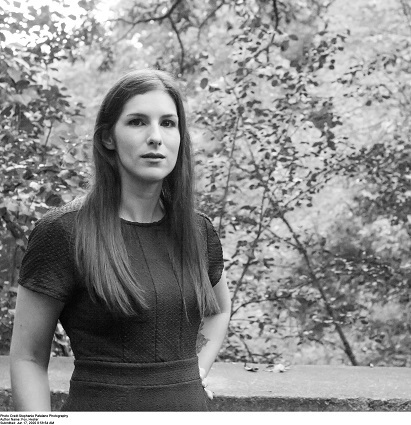 Hester Fox is a full-time writer and mother, with a background in museum work and historical archaeology. A native New-Englander, she now lives in rural Virginia with her husband and their son.
Hester Fox is a full-time writer and mother, with a background in museum work and historical archaeology. A native New-Englander, she now lives in rural Virginia with her husband and their son.
Social Links:
Author Website
Twitter: @HesterBFox
Instagram: @hesterbfox
Goodreads

The post New Release Spotlight — A LULLABY FOR WITCHES by Hester Fox appeared first on Quiet Fury Books.
January 28, 2022
Spotlight on THE PRISONER OF PARADISE by Rob Samborn
 The world’s largest oil painting. A 400-year-old murder. A disembodied whisper: “Amore mio.” My love.
The world’s largest oil painting. A 400-year-old murder. A disembodied whisper: “Amore mio.” My love.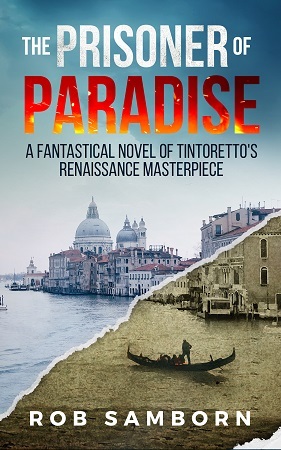 Nick and Julia O’Connor’s dream trip to Venice collapses when a haunting voice reaches out to Nick from Tintoretto’s Paradise, a monumental depiction of Heaven. Convinced his delusions are the result of a concussion, Julia insists her husband see a doctor, though Nick is adamant the voice was real.
Nick and Julia O’Connor’s dream trip to Venice collapses when a haunting voice reaches out to Nick from Tintoretto’s Paradise, a monumental depiction of Heaven. Convinced his delusions are the result of a concussion, Julia insists her husband see a doctor, though Nick is adamant the voice was real.
Blacking out in the museum, Nick flashes back to a life as a 16th century Venetian peasant swordsman. He recalls precisely who the voice belongs to: Isabella Scalfini, a married aristocrat he was tasked to seduce but with whom he instead found true love. A love stolen from them hundreds of years prior.
She implores Nick to liberate her from a powerful order of religious vigilantes who judge and sentence souls to the canvas for eternity. Releasing Isabella also means unleashing thousands of other imprisoned souls, all of which the order claims are evil.
As infatuation with a possible hallucination clouds his commitment to a present-day wife, Nick’s past self takes over. Wracked with guilt, he can no longer allow Isabella to remain tormented, despite the consequences. He must right an age-old wrong – destroy the painting and free his soul mate. But the order will eradicate anyone who threatens their ethereal prison and their control over Venice.
Book Details:Read an excerpt:Genre: Thriller
Published by: TouchPoint Press
Publication Date: November 30th 2021
Number of Pages: 333
ISBN: 1952816890 (ISBN-13: 9781952816895)
Series: The Paradise Series, #1
Purchase Links: Amazon | Barnes & Noble | Goodreads
The flood of questions never left Nick’s lips. Large hands wrenched him up by his armpits.
A hushed voice spoke in his ear. “Come with us. Quietly.”
The grip tightened.
Nick twisted his head to his sides. Bernardo led him away, staring straight ahead. Another security guard in a navy-blue suit flanked him. The man was about Nick’s age, with a close-cropped beard and light brown hair pulled into a tight ponytail—and considerably heftier than Bernardo.
“Dante,” said Bernardo to the guard, “please notify—”
Nick whipped his arms from Bernardo’s hold. Twisting, he whacked Dante’s earpiece, jamming the device into the large man’s head. Then he shouldered him into the nearest wall. Appalled gasps rose from the remaining tourists.
Bernardo grabbed Nick from behind. Nick’s elbow blasted backward, landing with a shattering blow in the man’s ribs. Dante dug his finger into his ear and pulled the piece out. He flicked it at Nick, poised to attack.
Confident he was quicker, Nick ducked, popped up, and discharged a quick snap of his fist.
Blood from the brawny guard’s nose sprayed across the polished marble wall.
Museum patrons, many holding cell phones, cameras, and tablets, backed up, giving the fight a wide berth. Nick clocked Bernardo. His wide tungsten wedding ring connected with the man’s jaw.
Bernardo stumbled, falling to the floor.
Nick sprinted for the exit and down the hall, tossing the hat and scarf as he ran.
Bursting through the Palazzo doors, he descended the Giants’ Staircase three steps at a time but slipped on the courtyard’s stone surface and crashed on his back. A jolt to his tailbone rang up his spine. He rolled onto his side and checked the staircase.
Bernardo and Dante loomed at the top. The two men hustled down, their dark jackets flowing behind them.
Tiny gravel pebbles burrowed into Nick’s palms as he scrambled up. He darted for the main entrance, disregarding what felt like a sledgehammer pounding his lower back with every step.
“Arrestatelo!” Bernardo called out.
Two uniformed guards rushed to block the front gate.
Nick stormed ahead.
The guards braced themselves. Nick plowed into the larger one, his speed and weight bowling the man over.
The smaller guard dove for Nick, wrapping a firm hold around his ankle. He pitched forward and fell to the ground.
“Fuck.” Nick kicked his free foot out. It hit the man’s cheek with a sickening crunch. A bloody tooth flew out and skipped across the ground. The guard’s grip loosened.
Nick clambered to his feet and bolted for the entrance. He dodged a college-aged tourist, jumped the turnstile, and sprinted for St. Mark’s Square.
A large woman in a neon pink shirt with a matching visor shouted at him. She pulled her young daughter to her as Nick ran by, almost knocking them down. He regretted the bedlam he was causing, but what choice did he have?
Pigeons flew upward in alarm as he made his way through the golden, late afternoon light of the square. He glanced over his shoulder.
Bernardo and Dante closed in, thirty feet away.
Nick’s throbbing back screamed for attention, but he upped his speed and crossed into an alley in the corner of the piazza. He reached the other side, raced through the passageway between buildings, and entered a narrow street. He shuffled into a group of revelers who had overflowed from a crowded wine bar. Shimmying through the people, he spotted a small bridge over the next canal. Nick dashed across it and made another right, which led him to yet another alley.
Stagnant, rank air engulfed him.
“Son of a bitch.”
A dead-end. Illegible graffiti covered the walls. Even in the moment, the vandalism pissed Nick off.
A steel door was the only possible exit. The rusty knob didn’t budge. Nick pivoted back toward the alley entrance.
His pursuers cast long shadows that extended to Nick’s sneakers. Despite their broken posture as they fought to catch their breath, their expressions championed triumph. Dante wiped the blood from his nose with a grin.
“You were warned more than once.” Bernardo’s voice echoed off the walls.
Unsure how he’d escape, Nick retreated until he bumped against the door.
The men advanced. Each pulled a silver short sword from a concealed holster beneath their suit jackets.
Fear and desperation caused Nick’s heart to pound so violently, he thought he heard it. But the blood churning through him generated a stronger urge: revenge. And he could only do right by Isabella if he survived this mess.
Bernardo lunged. Though burly and one-armed, his movements were lithe.
Nick dropped low as the sword whizzed over his head.
Dante positioned his weapon high and brought it down, slicing through Nick’s shirt and into his forearm.
Nick hollered as the pain seared through him.
He charged Dante, who raised his sword again. Nick caught his hand and body-checked him into the brick wall. Nick sensed Bernardo behind him and rotated, barely avoiding the blade slicing for his back.
Planting his foot, Nick went for the sword. His hands clenched around Bernardo’s, and they struggled for control of the hilt. Nick spat in his eyes and wrested the weapon away. With the last of his wavering strength, he slipped behind Bernardo and brought the sword to the man’s armpit under his one arm.
“Drop it,” he said to Dante, who had his back to the alley’s end.
Dante scowled but let his weapon fall with an echoing clang.
“Now kick it over here and lay down. On your stomach. Arms out.”
Dante did as instructed.
“Get next to him,” Nick ordered Bernardo with a shove. “Flat.”
Bernardo followed suit.
Retrieving Dante’s weapon, Nick kept watch on their forms. His opponents counterbalanced the stare, studying his every move. Nick wrapped his fingers around the hilts. Holding swords felt good. Natural. He flourished them simultaneously and grinned, unaware he had that skill.
Nick had a peculiar sensation, not that of anger but distinct determination. His mind played through potential outcomes, and one came into focus: he imagined rushing the men, and with raised blades, he hacked their bodies—first their faces, then their necks and torsos. Their warm blood drenched his skin.
The scene gave him a surge of foul power. He teetered from the unfamiliarity of it and shook his head to clear the image.
No. Nick wasn’t a murderer.
Instead, he turned and raced for the alley entrance, tossing the swords away in disgust. His heart sank as he heard the two men getting to their feet. Rounding the corner, Nick ran under an archway connecting two buildings. He angled for the building wall, stepped on a brick edge, and jumped up, catching an exposed pipe ten feet up.
As footsteps approached, he swung and kicked, striking a direct hit into Bernardo’s face. Bernardo toppled into Dante, the two landing hard on the ground. Nick dropped from the pipe and sprinted in the other direction, his torn shirtsleeve flapping off his bloodied arm.
***
Excerpt from The Prisoner of Paradise by Rob Samborn. Copyright 2021 by Rob Samborn. Reproduced with permission from Rob Samborn. All rights reserved.
Interview with Rob SambornTell us about your main character.
The main character of The Prisoner of Paradise is Nick O’Connor. He’s 28, from Boston, works as a software architect at Fidelity Investments, and plays amateur hockey. He’s madly in love with his wife, Julia. They met in college and have been together ever since. He’s very devoted to her and currently supporting her financially and emotionally as she’s switching careers and pursuing her dream of being a fine arts photographer. Nick can be impulsive, but he’s also a fun-loving guy who loves cracking jokes and going with the flow. Though he’d rather have a beer and watch a game, he’s always up for checking out art and culture—especially if it means spending time with Julia.
What is your favorite personality trait of your bad guy/girl?
The main antagonist is Salvatore della Porta, the director of the Palazzo Ducale (aka Doge’s Palace), the most important museum in Venice, as well as UNESCO world heritage site. He takes his job very seriously. He’s also the head of a secret society that may or may not have nefarious designs. He takes that job more seriously. My favorite personality trait is that he’s very self-aware. He’s surrounded by wealth and privilege but acutely aware he comes from a middle-class background. He had to work incredibly hard to reach his position and continues to do so. His life status hangs in the balance; one wrong move would mean the end of his career. Therefore, even when he’s doing wrong, he wholeheartedly thinks it’s for the right reasons. He’s a firm believer that the end justifies the means.
Your character has the music blasting. What’s playing, and what is he/she doing while listening?
This is an actual scene in the book. One of the main secondary characters is Carlo Zuccaro, a young emerging Venetian artist who is caught in the middle of the story. He’s often torn, not only between characters and decisions, but between past and future, as well. Secrets revolve around him and he doesn’t know who or what to believe. There’s a moment when Salvatore della Porta presents Carlo with questionable information. Carlo doesn’t want to hear it, so he blasts Italian electronic dance music.
I’m inviting your main character to dinner. What should I make?
Fegato alla Veneziana. Calf liver and onions served with polenta. It was a common Venetian dish for centuries. Uncommon in America, but has he had it before? To see more fireworks, offers a glass of grappa.
Your main character is planning a vacation. Where is he/she going?
Nick and Julia O’Connor are on vacation in Venice, Italy when the book opens. It’s definitely not where they’d to go again. They may not even get on a plane again. Give them a relaxing summer beach vacation in Cape Cod and they’ll be ecstatic.
Please share a few favorite lines or one paragraph.
Nick O’Connor couldn’t recall getting hit in the back of the head with a baseball bat, but it was the only explanation he could muster in his hazy state. A thick cloud capped the collateral pain streaming to his frontal lobe. He moistened his lips and shifted, mentally scanning his body for additional signs of trauma. His lower back ached, and his quadriceps screamed, but they were nothing compared to his head.
How do you decide on your book’s title?
I’ve had a few alternate titles, but ultimately, The Prisoner of Paradise was the ideal choice. “Paradise” is the name of the world’s largest oil painting, and a main feature of the book. Completed by Jacopo Tintoretto in 1592, it’s located in the Doge’s Palace in Venice and depicts Mary’s coronation in Heaven. It’s 75 feet wide by 40 feet high, with the base of the painting ten feet off the floor. There are hundreds of people depicted in this painting, making it look like a sea of bodies. The prisoner is Nick’s soul mate.
Do you set your books in real locations or do you make them up?
Every location in The Prisoner of Paradise is real. Since the book has some fantastical elements, it was critical that anything not fantastical is based on reality to ground the reader. Not only are the locations real, but paintings are real, historical events are factual, and known historical figures existed. Even certain locations or buildings that are not identified in the book are based on actual locations.
If you could go back to any place and time in history, where would you go and why?
Since my book is dual timeline, this question is a softball for me. I’d go back to 16th century Venice. Obviously, it would be remarkable for a present-day author to experience the time and place he wrote about, but beyond that, it’s also an incredible time and place in history, filled with art, culture and events that still resonate today. If I didn’t go there, I’d like to return to a prehistoric human settlement to experience what life was like back then. There have been incredible archeological discoveries in recent years that are rewriting history, such as Göbekli Tepe, a 10,000-year-old site in Turkey.
What are the 10 most played songs on your iPod/Mp3 player?
About the AuthorThe first ten songs of The Prisoner of Paradise playlist, available here: https://bit.ly/3BLmGdb
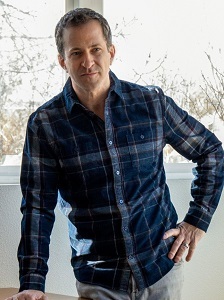 In addition to being a novelist, Rob Samborn is a screenwriter, entrepreneur and avid traveler. He’s been to forty countries, lived in five of them (including Italy) and studied nine languages. As a restless spirit who can’t remember the last time he was bored, Rob is on a quest to explore the intricacies of our world and try his hand at a multitude of crafts; he’s also an accomplished artist and musician, as well as a budding furniture maker. A native New Yorker who lived in Los Angeles for twenty years, he now makes his home in Denver with his wife, daughter and dog.
In addition to being a novelist, Rob Samborn is a screenwriter, entrepreneur and avid traveler. He’s been to forty countries, lived in five of them (including Italy) and studied nine languages. As a restless spirit who can’t remember the last time he was bored, Rob is on a quest to explore the intricacies of our world and try his hand at a multitude of crafts; he’s also an accomplished artist and musician, as well as a budding furniture maker. A native New Yorker who lived in Los Angeles for twenty years, he now makes his home in Denver with his wife, daughter and dog.
RobSamborn.com
Goodreads
BookBub – @rsamborn
Instagram – @robsamborn
Twitter – @RobSamborn
Facebook – @RobSambornAuthor
TikTok – @robsamborn
Tour Participants:
Visit these other great hosts on this tour for more great reviews, interviews, guest posts, and giveaways!
Join In & Win!This is a giveaway hosted by Partners in Crime Virtual Book Tours for Rob Samborn. See the widget for entry terms and conditions. Void where prohibited.
Get More Great Reads at Partners In Crime Tours
The post Spotlight on THE PRISONER OF PARADISE by Rob Samborn appeared first on Quiet Fury Books.
January 27, 2022
ARC Book Review — THE LATECOMER by Jean Hanff Korelitz
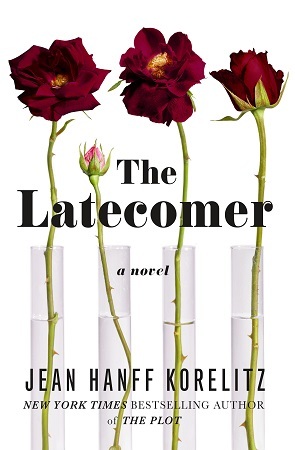
The Latecomer follows the story of the wealthy, New York City-based Oppenheimer family, from the first meeting of parents Salo and Johanna, under tragic circumstances, to their triplets born during the early days of IVF. As children, the three siblings – Harrison, Lewyn, and Sally – feel no strong familial bond and cannot wait to go their separate ways, even as their father becomes more distanced and their mother more desperate. When the triplets leave for college, Johanna, faced with being truly alone, makes the decision to have a fourth child. What role will the “latecomer” play in this fractured family?
A complex novel that builds slowly and deliberately, The Latecomer touches on the topics of grief and guilt, generational trauma, privilege and race, traditions and religion, and family dynamics. It is a profound and witty family story from an accomplished author, known for the depth of her character studies, expertly woven storylines, and plot twists.
Release Date: May 31, 2022
My ThoughtsI enjoyed Jean Hanff Korelitz’s last book, The Plot, and I was so excited to get an early copy of The Latecomer. Unfortunately, I didn’t like this one nearly as much.
The satire regarding education and liberal vs conservative viewpoints, and the divide this causes, is an undercurrent throughout that a lot of families will relate to.
The writing is a lot of tell, with little show. It reads exactly as it’s written; a secondhand account of a story told to us by someone who wasn’t there when most of it happened.
Pacing is slow. I was 150 pages in before the first thing of substance happened, which wasn’t at all a surprise because the narrator’s identity and the book’s synopsis ensures we know this will occur.
I know the focus of this story is the characters, rather than action, but I didn’t really like or connect with any of them. Each came off as a placeholder for a set of traits needed to express specific ideals.
My copy is almost 500 pages, and easily could’ve been cut down to about 350. The last 75 pages is where things get interesting and the characters begin to show some life. Still, they all went along behaving exactly as expected throughout.
*I received an ARC from Celadon Books.

The post ARC Book Review — THE LATECOMER by Jean Hanff Korelitz appeared first on Quiet Fury Books.
January 26, 2022
New Release Spotlight — GOOD RICH PEOPLE by Eliza Jane Brazier
 Lyla has always believed that life is a game she is destined to win, but her husband, Graham, takes the game to dangerous levels. The wealthy couple invites self-made success stories to live in their guesthouse and then conspires to ruin their lives. After all, there is nothing worse than a bootstrapper.
Lyla has always believed that life is a game she is destined to win, but her husband, Graham, takes the game to dangerous levels. The wealthy couple invites self-made success stories to live in their guesthouse and then conspires to ruin their lives. After all, there is nothing worse than a bootstrapper.
Demi has always felt like the odds were stacked against her. At the end of her rope, she seizes a risky opportunity to take over another person’s life and unwittingly becomes the subject of the upstairs couple’s wicked entertainment. But Demi has been struggling all her life, and she’s not about to go down without a fight.
In a twist that neither woman sees coming, the game quickly devolves into chaos and rockets toward an explosive conclusion. Because every good rich person knows: in money and in life, it’s winner take all. Even if you have to leave a few bodies behind.
Release Date: January 25, 2022
ExcerptGOOD RICH PEOPLE by Eliza Jane Brazier
Berkley Hardcover | On sale: January 25, 2022
Excerpt
LYLA
I get so bored sometimes, I think I will do anything to stop it. I decide to make Graham dinner. He blames me for what happened.
We don’t have anything in the kitchen except Mo‘t-dozens and dozens of bottles that Graham’s mother, Margo, keeps giving us, daring us to celebrate.
I decide to make spaghetti because it’s European and I think I can manage it on my own. The housekeeper got spooked and left, so we’ve been ordering in. I need to hire someone before Margo does, but I like how our house looks with a little dust. It looks like people actually live here.
I go to my closet to choose an outfit for the market. Everything in my closet is shades of gray. I’ve always wanted a signature color. Margo’s is white. Graham’s is blue. He says it’s a power color. All of my underwear is blue.
I select a gray cashmere top and gray cashmere bottoms. Not the same shade of gray, because I don’t want to look like an insane person. I accessorize with the exact right amount of diamonds and the hot pink gator Kelly bag I won in a game with Margo.
I stop to check my reflection in the full-length mirror. Sometimes I am scared by how beautiful I am. Every inch of me is buffed and primed. My face hangs exactly right. My muscles are taut and organized. I am scared because I don’t want to lose it: the shaped nails, the tip of my nose, the sapphire glow of my eyes. I am sad because I want everyone to see it, but I don’t want to see them. I want them to know how lucky I am but I don’t want them to have access to me. It’s a real problem.
I pass through the living room on my way out. It’s Monday and light is streaming through the wall of windows, onto the travertine dining table, the gold bar chairs, the carved silver accents. The house is decorated to Graham’s taste because I don’t have any. I acquired his taste the day we got married. It was easier that way. Marriages fail because people are different. I want to be the same. Look the same, feel the same, have the same appetites. I want to cross the stars for us.
I pass through the courtyard on my way toward the gate. The flowers stink. The fountain gurgles uselessly, like a body choking on its own blood.
Our house looks like a handful of glass tumbling down a hill. Our front facade is modern, stoic, but when you step inside, the house stretches, open-plan, back and back forever, until it reaches a wall of windows. What you can’t see from inside is the structures, the plinths underneath that hold it up, allow for the illusion of those never-ending floors.
In the hills, people will build anywhere. The more perilous the precipice, the more insecure the foundation, the more they need to build something on it. It’s a challenge, a victory of money over matter.
Our house is built on the edge of a cliff.
And underneath it, between those concrete plinths, is a hidden guesthouse. It was built to hold up the house above. Margo once used it to store her exotic shoe collection, but now we use it to store a person.
I exit the gate and lock the door behind me. I can see Margo’s tower above, chiseled to a point. Margo’s house is like a castle, with all the requisite wars and rumors of wars. Graham says one day we’ll live there, when he inherits everything, but I have no doubt that Margo will live forever to spite me.
I sometimes wish we would move somewhere, start our own life with our own money. But there is a little-known fact about people with money: They are beholden to people with more money. So although Graham could afford his own house and his own life, his mother has more money. His mother has money that makes our money look poor.
When you’re rich, you can control everything. Except the richer.
Graham is afraid of losing his mother’s money. Maybe even losing his mother-who knows? So we live in a glass house beneath her fortress, in a tidy alcove in the hills above Los Angeles, the ugliest and most beautiful city in the world, depending on where you’re standing.
There is a little village square with a market just three blocks away but I have to drive. The streets in the hills are narrow and uneven and there are no sidewalks. Only mad people walk in LA. For my birthday, Graham gave me a gray Phantom. It’s terrible to drive in the hills. I’ve scraped the back end four or five times and cracked the rear lights but Graham won’t fix them because he thinks it’s funny.
It takes me ages to get it out of the garage and even longer to navigate the narrow streets of the hills because inevitably cars appear going the other way and I have to honk until they back up. People are such assholes.
I finally make it under the stone archway that signals the village. It’s designed to look like a European enclave, all stone streets and storybook architecture. It really just looks like an abandoned fairy tale.
When Graham and I first moved in, we walked to the village market together at dusk to buy a bottle of red wine. The memory itself has very little to offer-it was dark and we were holding hands-but what I remember is not the night itself, but the promise of the future contained in it, how I thought that we would do this again, perpetually: walk beneath the arches in the semidark, kiss in the stone corner of the vintage boutique, pretend we were a couple out of time. I remember saying, This is so magical. It’s like we’re somewhere else. It’s like Disneyland!
Now I drive beneath the arches and I think, We never came again. Not once. Graham works. We order everything in. If I ask him to go for a walk, he says, Are you kidding? Rich people don’t walk. Their shoes aren’t designed for it.
I get to the market and find handmade pasta, but the sauces are all wrong. There is a clerk beside me filling the shelves-a teenager with a constellation of zits from his ear to his throat.
“Excuse me?” I hold out the priciest pasta sauce. “Why is this so inexpensive? Is there something wrong with it?”
The attendant looks flummoxed, like he has never been asked such a question. “Uh . . . I’d have to ask.”
“Do you have anything more expensive?”
He blinks. “Uh . . . you could buy two?”
“You should make it from scratch.” A familiar woman approaches from farther down the aisle. I’ve probably seen her in the neighborhood. I turn to face her. She has three necklaces around her neck, so I know she’s crazy. One is a star, one is a circle and one is a cactus. I’ve seen the star necklace before, but it’s a popular design.
“Me?” I can’t believe she’s talking to me. Her under-eye area is clogged with mascara dust. She has wrinkles but she is probably younger than me. She just doesn’t have a good doctor.
“It would be more expensive if you bought all the ingredients separately.” She crosses her arms. She carries a shopping basket, but it’s empty.
I set the pasta sauce back on the shelf, stamp my foot, throw up my hands. “I have no idea what’s in pasta sauce!” I say, like nobody does.
“I can help you”-she shifts her hip-“if you want.” She purses her chapped lips. Those three necklaces glitter with menace. But Graham would be so impressed if I made my own pasta sauce. Even more impressed if I had someone make it for me.
The corner of my Kelly bag is digging into my side, so I adjust it. “Oh, would you? I would so appreciate it.” She nods eagerly. I indicate my cart. “Would you mind? It’s so hard to carry a bag and push a cart.” I frown.
She hesitates, face closing. She doesn’t know what it’s like having to carry a Kelly bag everywhere. It’s not like I can just put it in the cart!
She sighs and swings her plastic basket into my cart. I follow her to the produce section. She finds me the priciest tomatoes, precut garlic, red onions. It’s a good thing I’m there, because one of the onions looks dirty and I make sure she swaps it out. As she shops, she explains to me how to mix everything together. Of course, I don’t pay attention. I hate listening to people when they talk.
“Got it?” she asks when all the ingredients are in my cart.
“No,” I say blithely. She shifts from foot to foot. “I’ll never get it! We used to have a housekeeper who did all this, but we had to let her go,” I lie. “She was very religious.” That part is true. She suggested we were all going to hell. I privately thought hell couldn’t be worse than Margo. At least in hell you don’t have hope.
“I could help you,” the woman says, “if you want.” She adjusts her empty basket. “I’m actually looking for work.”
I find myself considering it. She seems to know her stuff, and I do need to hire someone before Margo does. It looks like I would be doing the woman a favor. Her hair is knotted. Her eyes lack sleep. Her nail beds are dirty and uneven. She’d be very lucky to work for us. There are far worse places to be.
Her necklaces remind me of something, but I can’t remember what.
Maybe it’s someone I used to know.
Or maybe it’s me.
About the AuthorEliza Jane Brazier is an author, screenwriter and journalist. She currently lives in California where she is developing If I Disappear for television. Follow Eliza on Twitter @EJaneBrazier, Instagram @elizajanebrazier, and Facebook @ElizaJaneBrazier.
The post New Release Spotlight — GOOD RICH PEOPLE by Eliza Jane Brazier appeared first on Quiet Fury Books.
January 25, 2022
New Release Spotlight — LIGHT YEARS FROM HOME by Mike Chen
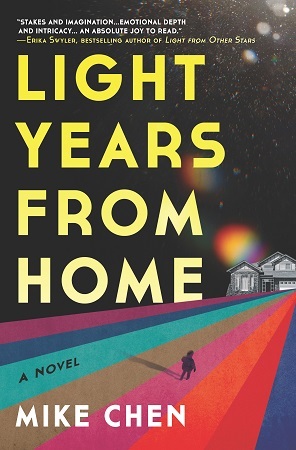 Every family has issues. Most can’t blame them on extraterrestrials.
Every family has issues. Most can’t blame them on extraterrestrials.
Fifteen years ago while on a family camping trip, Jakob Shao and his father vanished. His father turned up a few days later, dehydrated and confused, but convinced that they’d been abducted by aliens. Jakob remained missing.
The Shao sisters, Kass and Evie, dealt with the disappearance end ensuing fallout in very different ways. Kass over the years stepped up to be the rock of the family: carving a successful path for herself, looking after the family home, and becoming her mother’s caregiver when she starts to suffer from dementia. Evie took her father’s side, going all in on UFO conspiracy theories, and giving up her other passions to pursue the possible truth of life outside our planet. And always looking for Jakob.
When atmospheric readings from Evie’s network of contacts indicate a disturbance event just like the night of the abduction, she heads back home. Because Jakob is back. He’s changed, and the sisters aren’t sure what to think. But one thing is certain — the tensions between the siblings haven’t changed at all. Jakob, Kass and Evie are going to have to grow up and sort out their differences, and fast. Because the FBI is after Jakob, and possibly an entire alien armada, too.
Light Years from Home : a novel
Mike Chen
On Sale Date: January 25, 2022
9780778311737
Hardcover
MIRA Books
$27.99 USD
352 pages
BUY LINKS:
Bookshop
B&N
Amazon
Kobo
Apple Books
Google Books
Walmart
Jakob
Everything in front of Jakob Shao was dark.
His eyes adjusted after several seconds, turning the void into a black sheet laced with brilliant white dots, countless stars coming into focus. Jakob raised a finger and poked at the nothingness, only to feel a magnetic pushback from deflective impulses. Force fields, really, as Jakob still used the Earth terminology brought from a childhood of movies and comic books. Whatever they were called, they kept the vacuum of space from sucking him out, freezing him, possibly imploding him.
The atmosphere dock of the Awakened ship wasn’t much more welcoming than deep space. It didn’t help that he stood barefoot and nearly naked, only an ill-fitting cloth halfway between a burlap sack and a poncho draped over him. The Awakened probably used it more to maintain their hostage’s body temperature than comfort, and definitely not for fashion. But where were his captors?
Where was anyone?
Then a voice called out.
A familiar voice, a not-human one that strained to yell his name in a vocalization that came halfway between a crow’s caw and an electronic blip. The implanted chips between Seven Bells soldiers constantly translated for species, but nothing came through here. Something must have burned out the chip, leaving only natural expression, a human word forced into alien physiology.
It called Jakob’s name.
Jakob ran to the voice, tracing the sound while rumbles vibrated the floor. Spigots of steam and gaseous vapor burst onto him, and his bare feet crunched on jagged debris. He turned a corner and though different lights flashed and fluctuated through the dim space, he saw a familiar figure.
Henry .
The unmistakable silhouette of curling horns and humanoid frame of Henry’s native species stood out against beams of light, and Jakob called out. “Henry!”—The simplest name he could assign to his friend given the physically impossible way of pronouncing their culture’s names. A harsh draft blew dust in his face, fragments hitting his bare shoulders as he charged forward. “Henry! We need to go right—”
Except Henry would not be able to go anywhere.
Stripped of his standard armor and clothing, his friend’s set of eight eyes all focused on him, their face angling away. One arm reached out to Jakob, straining to move.
The other remained frozen, a statue pose as the crystallization took over, organic matter gradually desiccating from the bottom up. Jakob paused, slowly putting together what it all meant.
Jakob was in the Seven Bells first wave of defense, but his power-armor mech had been damaged and he was captured in space. Henry was to lead the second wave, an on-the-ground defense squad that took advantage of his native planetary knowledge.
They must have failed. Which meant Henry’s homeworld had fallen to the Awakened, their technology analyzed and usurped, their population and wildlife crystalized to be used as building material.
Jakob took his friend’s hand, a pincer-like claw with small sensory tentacles in the palm. “I’m so sorry. So sorry,” Jakob said repeatedly, taking far too much time given the exploding craft around him. Henry’s shoulder froze, body crystalizing from elbow to forearm to claws until the whole appendage stiffened and the sensory tentacles stopped moving. Jakob leaned forward as an invisible weight suddenly pushed in on his skull, a pressure from the center outward. He looked at Henry, only their head and neck remaining, eyes closed, but tilted his way.
Jakob knew what to do, what Henry wanted. It was the way their species passed on generational knowledge during final moments.
He let Henry in.
And several seconds later, Jakob absorbed information, secrets, devastation, all of the things that Henry saw and felt while Jakob had been captured. And a number.
A sixteen-digit number that could change everything.
“Go,” Henry managed in their unearthly voice before the crystalization process inched upward, eventually taking over their entire head with a sparkly dead texture.
Then his friend collapsed, their transformed body falling apart like a sand castle imploding under its own wait. Henry’s remains scattered, spilling everywhere and getting between Jakob’s toes. When he turned, he felt the grind beneath his feet.
But there was no time to mourn or be disgusted. He needed to go. But where?
Jakob sprinted, checking all corners and hallways. But whatever had happened before he came to had caused the ship to be evacuated, mostly ransacked of anything useful. At a hanger bay, his captured half-wrecked mech sat, stripped of any useful tools. The only thing intact was a decryptor—a tool for espionage. Not escape.
That wouldn’t help here, though he grabbed the device anyway—technically, a neural encryptor/decryptor—and looked for a way out. In the corner, a holographic interface flickered on and off.
That just might do it.
A closer look had Jakob laughing at his luck: the half-functioning interface was the ship’s compressed-matter transporter system, something he was familiar with since the Seven Bells regularly scavenged them from downed Awakened craft. He craned his neck up at the too-tall interface next to him, fingers flying over controls he understood just enough to operate. It hummed to life, a low vibration nearly eclipsed by the ongoing rumbles of various decks exploding above him. A white glow signified it was ready to fire him across space.
Him—and the knowledge he’d stolen.
But what destination would provide safety until the Seven Bells recovered him?
A star chart glowed in front of him, and the vast pool of space lay at his fingertips. One of those tiny dots represented a chance. He just had to figure out which one—fast.
Jakob scanned the possibilities, already tensing for the brutal gauntlet of compressed matter transport: an invisible bubble sealing around the body, then throttling it through a newly generated wormhole that collapsed upon exit. He needed somewhere safe, somewhere primitive that the Awakened would completely overlook. Only then could he track his fleet without putting them in danger. Solar system upon solar system whirred in front of him, the options coming and going until he paused at one choice.
One obvious, hilarious, completely impossible choice.
Earth. The place he’d departed fifteen years ago.
Jakob zoomed in on the image, examining its projected rotation. Pure dumb luck handed him a win here; they were passing through within three light years, perfectly within the edge of the transporter’s radius. The holographic light pulsed, indicating the system was ready to go.
But what if the Awakened chased him, captured him again? He could hide his body, yet his mind still represented a risk: specifically, the device implanted in his head that connected to the Seven Bells command fleet, activated only when speaking the right words. The Awakened were known for torturing to the point of unconsciousness, trying to pry secrets that might tip the war one way or another, except he’d been trained to protect the activation phrase with his life.
His life for the entire fleet’s life.
But did the Awakened have other ways to extract that information, something more strategic than pain? If they tracked him down, could they try some type of mental probe or memory scanner?
Jakob turned to think, his bare foot kicking against a smooth object that suddenly caught his attention.
The decryptor he salvaged—a basketball-sized device that could scramble certain parts of his memory. A way to blank out the activation phrase from his mind, guaranteeing its safety—and thus, the fleet’s safety—in any situation until the Seven Bells located him. Jakob calculated the risks. As one of the Seven Bells’ leading engineers, patching up damaged equipment in the heat of battle was standard procedure. But scrambling and patching up his own mind?
There was a first time for everything.
Jakob held the decryptor to his forehead, pressing it firmly and thinking as hard as he could about the specific phrase to activate the skull implant’s emergency communications signal. A very quick, very sharp zap hit him, and with it, scrambled that memory, now unlockable solely with this very device.
But he suddenly realized that if the zap’s blast radius scrambled tangential memories, he might lose more: what had happened, what he needed, his whole mission. Jakob’s eyes darted around, searching the broken space for something that might provide a way to give himself tangible backup clues.
The pipes on the walls.
Whatever liquid they contained might be as good as ink.
He grabbed jagged shrapnel off the floor and smashed the line, neon blue dripping out. It didn’t produce steam or eat through the floor. Good enough. His finger stung a little under the viscous liquid, and with it, he wrote words on his exposed skin.
SIGNAL. WEAPON.
Dizziness and nausea struck as details blurred out of existence, and Jakob knew disorientation would hit soon enough. He held the decryptor close, hugging it while activating the scan sequence of the transporter. A thin beam of light trickled over him, a tingle crawling over his skin while the transporter calculated the shape and strength of its protective bubble. It nearly finished when sparks flew from the far side of the room, another shake knocking him off balance.
“Shit, shit, shit,” he said while reinitiating the scan, uttering Earth curses that still stayed with him. The scanning beam re-appeared, only to stop halfway down his body. He tried again and then again, but each time, it refused to move past the decryptor.
Jakob squinted at the repeated message on the transporter’s interface, but without the supporting communications tech from Seven Bells on him, it was incomprehensible. He looked at the decryptor in his hand, then back at the interface, then over at the message.
Maybe that was it. Jakob with the device might be too much.
He set the decryptor on the floor and retargeted the scan beam. Several seconds later, a planetary image indicated a target destination. The decryptor shot off across space, a simple white flash as it vanished.
He’d have to find it. But what if the decryptor’s memory fallout erased those details? What if the transporter veered him off course on his own journey? How would he even know where to start?
Jakob turned back to the holographic map; the decryptor had been sent somewhere on the west coast of the North American continent. The Bay Area. Images flashed through his mind, faces surfacing after so many years of disconnecting from that life.
Mom. Dad. Kassie. Evie.
Home.
Such a word felt weightless, devoid of any meaning now. But it gave a shorthand to the decryptor’s location.
He jabbed his finger into the smashed pipeline, dipping into enough alien goo to write one more message. GO HOME, he wrote across his left shoulder. That would point him in the right direction, no matter where on Earth he started.
Jakob took in a deep breath, then hit the controls again on the transporter. The beam returned, scanning him up and down. Seconds passed and the air changed, like he was encased in a layer of plastic— pressurized energy protecting him across the vacuum of space. Around him, various hums and vibrations indicated the system would activate in moments.
The room shook as a hole tore open in the ceiling, fire and shrapnel showering him.
“Weapon. Signal. Go home.” He told himself, repeating the words. If all the writing dissolved or washed off, he could try to remember these few words. He readied himself, and only now did he notice bits of crystalline sand stuck to his legs and feet. Nausea hit Jakob, but whether it came from the decryptor process or seeing Henry’s remains, he wasn’t sure. Fists formed with tight fingers and tensed arms, and he forced himself to picture Henry’s crumbling body, a reminder of why he needed to do this.
“Weapon. Signal.”
He had to make it to Earth safely. He had to retrieve the decryptor and contact the fleet.
Because he wasn’t just a Seven Bells soldier trying to find a way back. Those sixteen digits Henry had chiseled into his mind would win the war.
He just needed to tell them first.
“Go home.”
Excerpted from Light Years from Home by Mike Chen, Copyright © 2022 by Mike Chen. Published by MIRA Books.
About the Author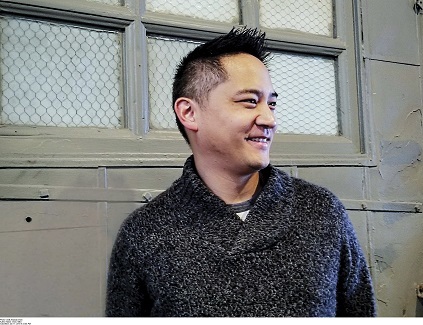
Mike Chen is the author of the award-nominated Here And Now And Then and featured in Star Wars: From A Certain Point Of View—The Empire Strikes Back. He has covered geek culture for sites such as Tor.com, The Mary Sue, and StarTrek.com and used to cover the NHL for Fox Sport and other outlets. A member of SFWA, Mike lives in the Bay Area with his wife, daughter, and rescue animals.
SOCIAL LINKS:
Author website: https://www.mikechenbooks.com/
Twitter: @mikechenwriter
Instagram: @mikechenwriter

The post New Release Spotlight — LIGHT YEARS FROM HOME by Mike Chen appeared first on Quiet Fury Books.
January 24, 2022
Intense New Thriller — THE OVERNIGHT GUEST by Heather Gudenkauf
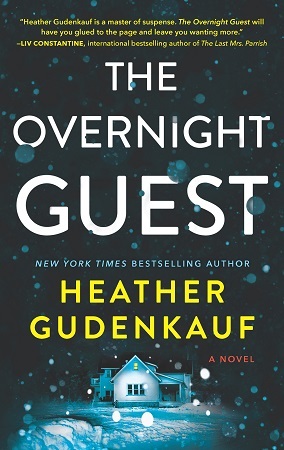 In a snowstorm, the safest place is home. Or is it?
In a snowstorm, the safest place is home. Or is it?
True crime writer Wylie Lark doesn’t mind being snowed in at the isolated farmhouse where she’s retreated to write her new book. A cozy fire, complete silence. It would be perfect, if not for the fact that decades earlier, at this very house, two people were murdered in cold blood and a girl disappeared without a trace.
As the storm worsens, Wylie finds herself trapped inside the house, haunted by the secrets contained within its walls—haunted by secrets of her own. Then she discovers a small child in the snow just outside. How long had the child been there? Where did he come from? Bringing the child inside for warmth and safety, she begins to search for answers. But soon it becomes clear that the farmhouse isn’t as isolated as she thought, and someone is willing to do anything to find them.
THE OVERNIGHT GUEST
Author: Heather Gudenkauf
ISBN: 9780778311935
Publication Date: January 25, 2022
Publisher: Park Row Books
Buy Links:
BookShop.org
Harlequin
Barnes & Noble
Amazon
Books-A-Million
Powell’s
Three
“Maybe we can go outside and play?” the girl said as she peeked around the edge of the heavy curtain that covered the window. The sky was gray and soft drops of rain tapped at the glass.
“Not today,” her mother said. “It’s raining and we’d melt.”
The girl gave a little laugh and then hopped off the chair she had dragged beneath the window. She knew her mother was teasing. They wouldn’t actually melt if they went out in the rain, but still, it made her shiver thinking about it—stepping outside and feeling the plop of water on your skin and watching it melt away like an ice cube.
Instead, the girl and her mother spent the morning at the card table cutting pink, purple, and green egg shapes from construction paper and embellishing them with polka dots and stripes.
On one oval, her mother drew eyes and a pointy little orange beak. Her mother laid the girl’s hands on a piece of yellow paper and traced around them using a pencil. “Watch,” she said as she cut out the handprints and then glued them to the back of one of the ovals.
“It’s a bird,” the girl said with delight.
“An Easter chick,” her mother said. “I made these when I was your age.”
Together, they carefully taped the eggs and chicks and bunny rab-bits they created to the cement walls, giving the dim room a festive, springy look. “There, now we’re ready for the Easter Bunny,” her mother said with triumph.
That night, when the girl climbed into bed, the butterflies in her stomach kept chasing sleep away. “Stay still,” her mother kept re-minding her. “You’ll fall asleep faster.”
The girl didn’t think that was true, but then she opened her eyes, a sliver of bright sunshine was peeking around the shade, and the girl knew that morning had finally arrived.
She leaped from bed to find her mother already at the tiny round table where they ate their meals. “Did he come?” the girl asked, tucking her long brown hair behind her ears.
“Of course he did,” her mother said, holding out a basket woven together from strips of colored paper. It was small, fitting into the palm of the girl’s hand, but sweet. Inside were little bits of green paper that were cut to look like grass. On top of this was a pack of cinnamon gum and two watermelon Jolly Ranchers.
The girl smiled though disappointment surged through her. She’d been hoping for a chocolate bunny or one of those candy eggs that oozed yellow when you broke it open.
“Thank you,” she said.
“Thank the Easter Bunny,” her mother said.
“Thank you, Easter Bunny,” the girl crowed like the child on the candy commercials that she’d seen on television. They both laughed.
They each unwrapped a piece of gum and spent the morning making up stories about the paper chicks and bunnies they made.
When the girl’s gum lost its flavor, and she had slowly licked one of the Jolly Ranchers into a sharp flat disc, the door at the top of the steps opened, and her father came down the stairs toward them. He was carrying a plastic bag and a six-pack of beer. Her mother gave the girl a look. The one that said, go on now, mom and dad need some alone time. Obediently, the girl, taking her Easter basket, went to her spot beneath the window and sat in the narrow beam of warm light that fell across the floor. Facing the wall, she unwrapped another piece of gum and poked it into her mouth and tried to ignore the squeak of the bed and her father’s sighs and grunts.
“You can turn around now,” her mother finally said. The girl sprang up from her spot on the floor.
The girl heard the water running in the bathroom, and her father poked his head out of the door. “Happy Easter,” he said with a grin. “The Easter Bunny wanted me to give you a little something.”
The girl looked at the kitchen table where the plastic bag sat. Then she slid her eyes to her mother, who was sitting on the edge of the bed, rubbing her wrist, eyes red and wet. Her mother nodded.
“Thank you,” she murmured.
Later, after her father climbed the steps and locked the door behind him, the girl went to the table and looked inside the plastic bag. In-side was a chocolate bunny with staring blue eyes. He was holding a carrot and wore a yellow bowtie.
“Go ahead,” her mother told the girl as she held an ice pack to her wrist. “When I was little, I always started with the ears.”
“I don’t think I’m very hungry,” the girl said, returning the box to the table.
“It’s okay,” her mother said gently. “You can eat it. It’s from the Easter Bunny, not your dad.”
The girl considered this. She took a little nibble from the bunny’s ear and sweet chocolate flooded her mouth. She took another bite and then another. She held out the rabbit to her mother and she bit off the remaining ear in one big bite. They laughed and took turns eating until all that was left was the bunny’s chocolate tail.
“Close your eyes and open your mouth,” her mother said. The girl complied and felt her mother place the remaining bit on her tongue and then kiss her on the nose. “Happy Easter,” her mother whispered.
Excerpted from The Overnight Guest by Heather Gudenkauf, Copyright © 2022 by Heather Gudenkauf. Published by arrangement with Harlequin Books S.A.
Holy atmosphere, Batman!
The Overnight Guest had me on edge from start to finish. This story is intense!
I loved the characters and the way their secrets were slowly revealed as all the pieces snapped together.
Setting adds another layer of creepiness to the plot’s complexities.
Perfect pacing, fantastic writing—all the praise!
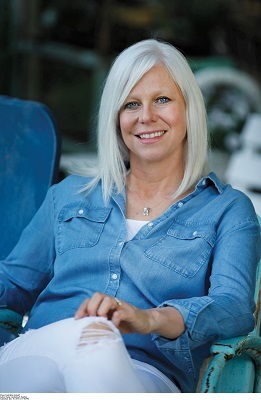 Heather Gudenkauf is the critically acclaimed author of several novels, including the New York Times bestseller The Weight of Silence. She lives in Iowa with her husband and children.
Heather Gudenkauf is the critically acclaimed author of several novels, including the New York Times bestseller The Weight of Silence. She lives in Iowa with her husband and children.
Social Links:
Author Website
Instagram: @heathergudenkauf
Twitter: @hgudenkauf
Facebook: @HeatherGudenkaufAuthor
Goodreads

The post Intense New Thriller — THE OVERNIGHT GUEST by Heather Gudenkauf appeared first on Quiet Fury Books.
January 23, 2022
Book Review — DO YOU FOLLOW? by J.C. Bidonde
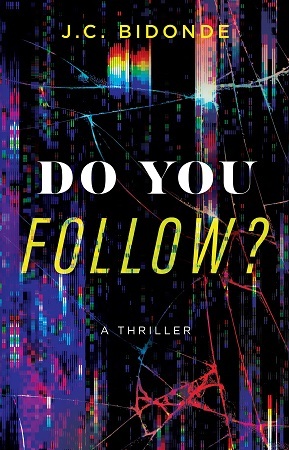
Alexa lives a sheltered life with her widowed father, feeling stifled by his helicopter parenting. When she secures a marketing job and apartment in New York City—much to her father’s and therapist’s concern—Alexa has high hopes of finally sneaking her way into adulthood. But her newfound freedom is cut short when her estranged twin sister Beth, after a long stint in a psychiatric setting, unexpectedly shows up at the doorstep of her tiny apartment.
Alexa too has spent time at the Weinstein Center. But she’s determined to lead a normal life now and soon begins to date a YouTuber client. According to Beth, something isn’t quite right with Curt, but Alexa shrugs her clingy sister’s warnings off. It’s Beth who’s crazy, after all . . . As the sister bond grows strained over Alexa’s relationship and career success, questions mount, and secrets unfold, revealing the wickedly dark shared history of the twin siblings. What exactly happened when the twins were only nine that set this vile trajectory in motion?
Things get more complicated, and one treacherous act threatens everything Alexa has been working toward. It will be on her—and Beth—to claw the way out of this situation.
Published: January 4, 2022
My ThoughtsJust say no to Do You Follow?
This book frustrated me all the way through.
The story is predictable, yet implausible.
Mental illness is portrayed with extreme creative license. All I can say without spoilers is that lots of what goes on does not fit the big reveal.
The final twist is one of those “seriously?” moments.
Total disappointment for me.
*I received an ARC from Greenleaf Books, via a BookishFirst giveaway.*

The post Book Review — DO YOU FOLLOW? by J.C. Bidonde appeared first on Quiet Fury Books.




